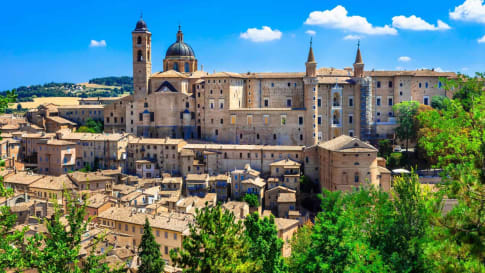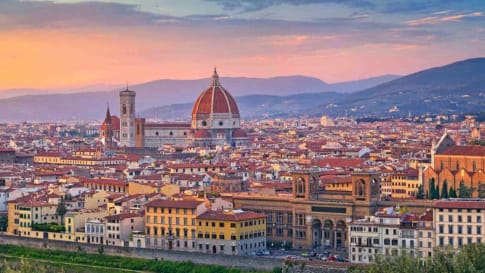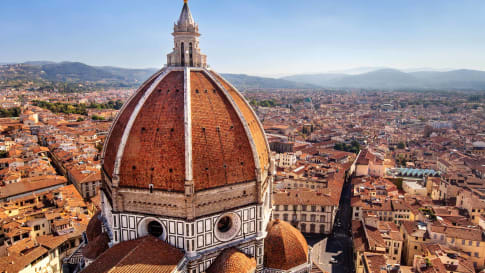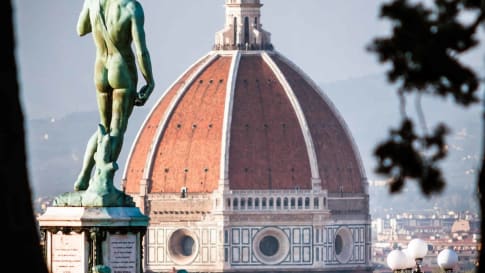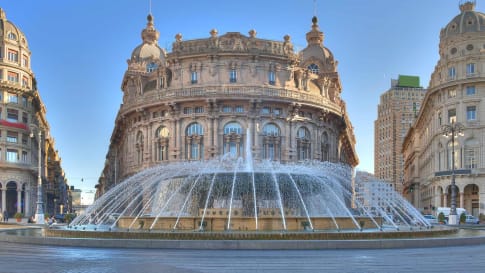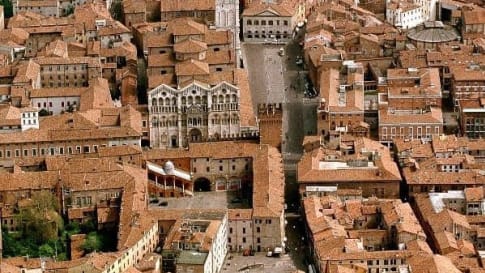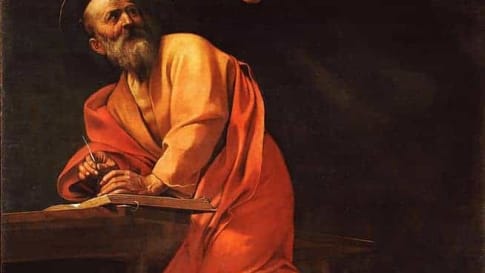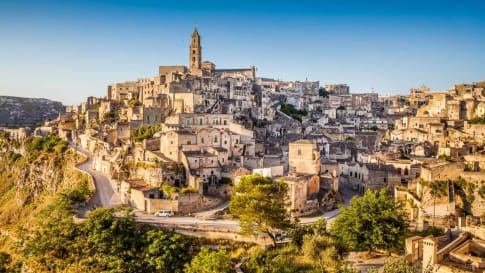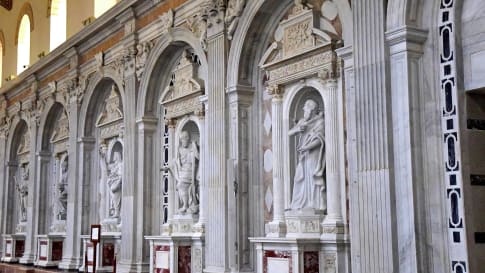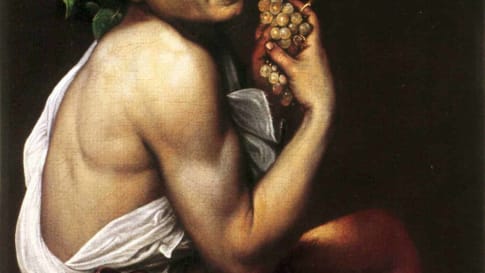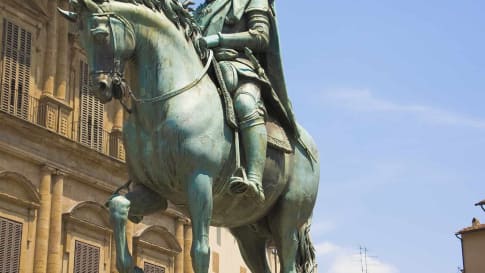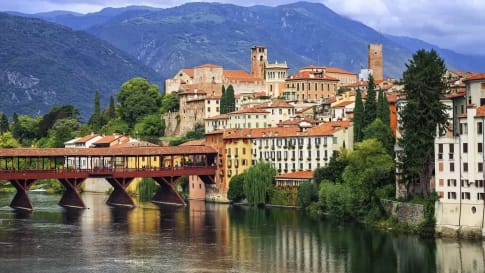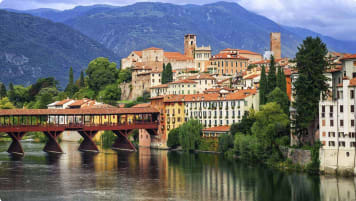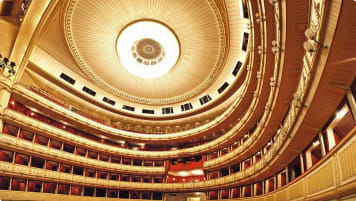Renaissance Italy Tour: Story of Five Families
Explore Renaissance Italy on this small group tour though an examination of five significant city states. Florence, Urbino, Ferrara, Mantua and Milan were all dominated by families determined to increase the status of their city through art and architecture. Spend time coming to know the men and women who helped create the cities, as well as the magnificent legacy they left behind.
From A$14,295AUD
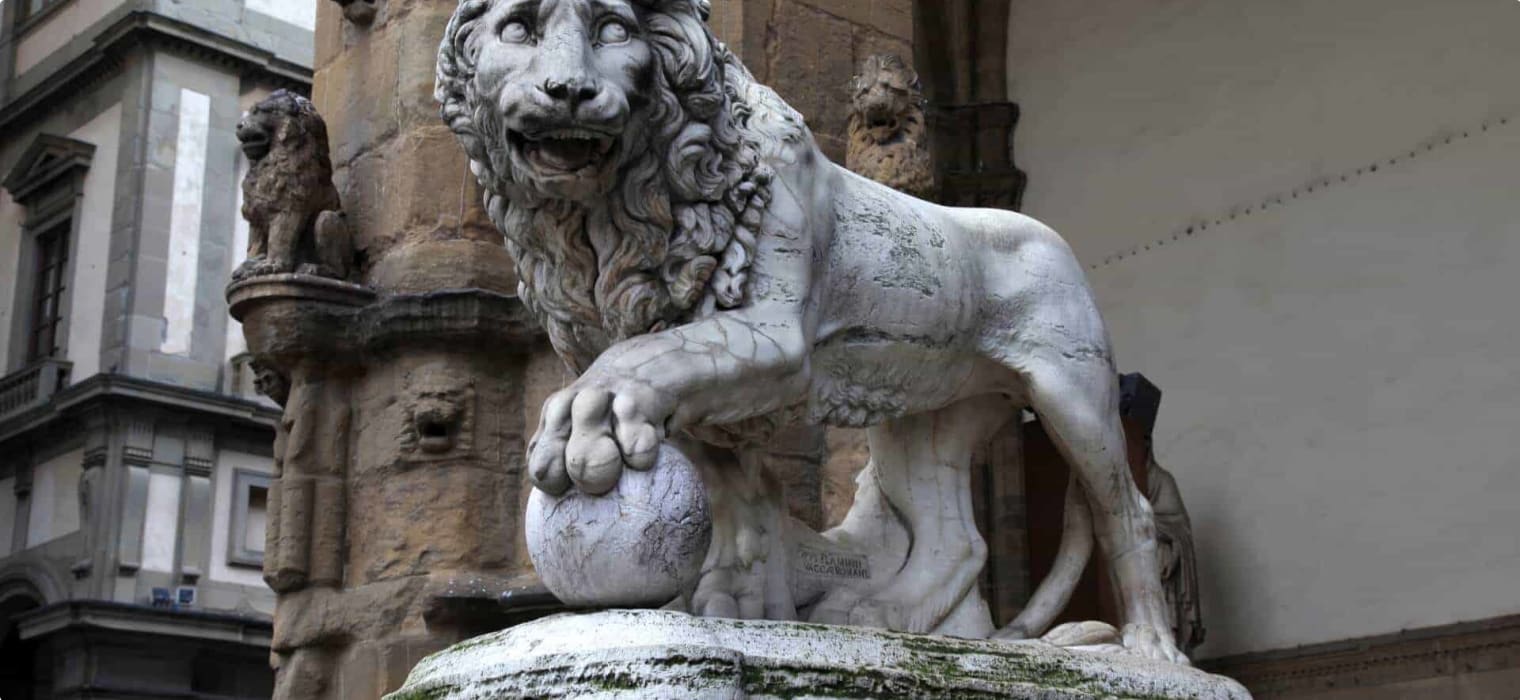
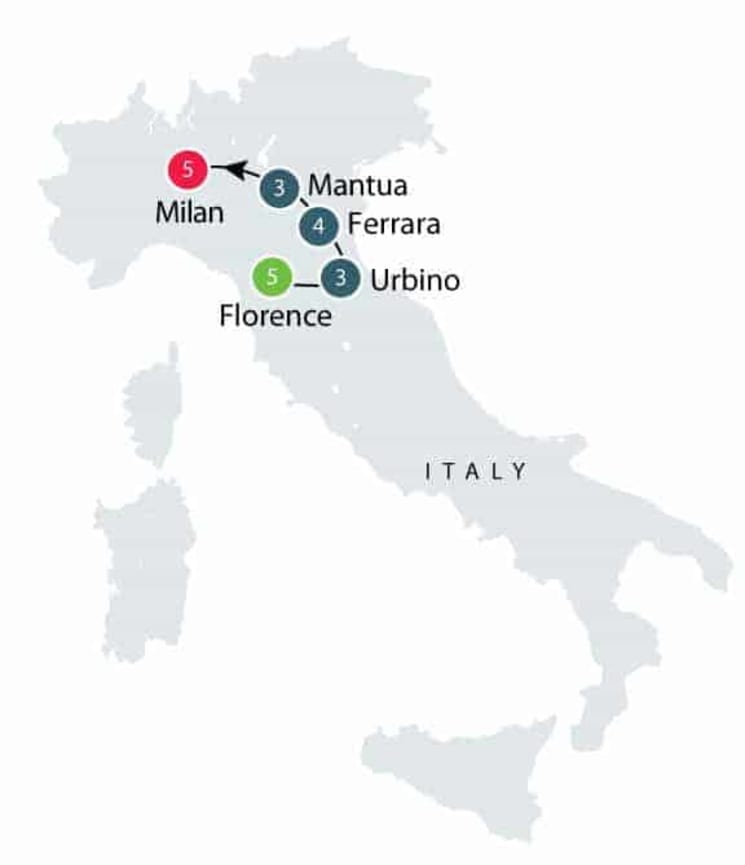
Departure Dates
| Departure Date | Price |
|---|---|
| 23 August 2025 Ends 12 September 2025 • 21 days A$14,995 Twin A$17,195 Single Available | Selected |
| 23 May 2026 Ends 12 June 2026 • 21 days A$14,995 Twin A$17,195 Single Available | |
| 22 August 2026 Ends 11 September 2026 • 21 days A$14,995 Twin A$17,195 Single Available |
Renaissance Italy, story of five families
Odyssey offers easy, convenient, and relaxed escorted small group tours across Italy and beyond. We explore Italy's fairy-tale natural beauty, and the Imperial heritage of the Renaissance, its World Heritage Sites, and world famous cities, all with some truly spectacular scenery along the way. This and more is all waiting to be explored on one of Odyssey’s small group tours of Italy, designed for the senior traveller, and led by experienced, and enthusiastic like minded people.
The Renaissance Italy small group history tour designed for mature or senior travellers. We welcome both couples or solo travellers who are looking to explore a road less travelled in Europe. In the 15th and 16th centuries the principalities that became Italy were alive with new ideas. The boundaries of art, architecture, music, science, politics, religion and literature were pushed. It was also riven by bitter rivalry and even open warfare between the numerous independent city states. Out of this chaos and upheaval emerged a number of significant families who drove the development in their individual cities. In a number of cases their quarrels also led to the destruction of much of what they had achieved. This tour concentrates on the story of five families. Five very important Italian renaissance families and the cities they helped to build.
- The Medici of Florence
- The Montefeltro of Urbino
- The Este of Ferrara
- The Gonzago of Mantua
- The Sforza of Milan
This story of five families is all that Hollywood seeks in a blockbuster. They intermarried, occasionally they were allies against the Pope, the king of Naples, the king of France and other states. Sometimes they fought pitched battles against each other. But all five families left an amazing legacy of buildings and art works which you can admire today on this small group that looks at the Renaissance of Italy the families that made it happen.
About this Renaissance Italy tour
In this Italian renaissance small group tour we take the time to explore these five independent cities. We learn through our local guides about the families who drove the development of each city. Florence in Tuscany is always part of the tourist trail. The other four cities are often over-looked due to more popular destinations, but each is Renaissance a gem. Everyone has heard of Milan though surprisingly it is not high on the average tourist’s list of “must see” cities. Urbino, Ferrara and Mantua are often ignored completely. This tour spends up to 5 nights in each city to explore these hidden gems and create a unique travel experience. You learn and see why each is so important to any study of Renaissance Italy. We will look particularly at the palaces, churches, civic buildings. Your tour also explores the frescoes, and other art works created for these families by some of the most significant artists of the period.
Florence
During the early period of Medici influence Florence was not a ducal state. The Medici family did not rule as hereditary monarchs. Florence was, in name at least, a republic until early in the 16th century. But the Medici family had the wealth and the influence to run the state as they saw fit for much of the 15th century. The renaissance period saw the rise of Cosimo d’Medici and his son Lorenzo the Magnificent. It was a period that witnessed the murder of Lorenzo’s brother, Giuliano. It saw the ascendancy of two Medici popes to the papal throne and the short rule of the religious reformer Savonarola. During this period the Medici family built a great many splendid palaces filled with amazing art works.
Urbino
Urbino is a small important city state ruled by the Montefeltro family during the Renaissance period. The city of Urbino also has Word Heritage status. It is a classic hill town with medieval walls, four gates, narrow streets and many steps. Frederico de Montefeltro ruled the city between 1414 and 1482. Montefeltro's stated aim was to make his city “comfortable, efficient and beautiful”. Frederico was an able warrior, a distinguished diplomat and an enthusiastic patron of all the arts. Here in Urbino, Piero della Francesca wrote on the science of perspective, Francesco di Giorgio Martini on architecture and Giovanni Santi, the father of Raphael, on the history of art.
Ferrara
Ferrara, another city listed as a site of World Heritage importance, was ruled by the Este family from the mid-13th century until the death of the last heir in 1597. During this period the Este family created a city full of great art and architecture. The city developed particularly under the rule of Ercole d’Este in the late 15th and early 16th centuries. He had the city re-planned using the most modern of renaissance designs leaving it one of Italy’s best planned renaissance cities. Scandal, however, was never far from the Este family. The infamous Lucrecia Borgia married into the family. In the Corpus Domini Monastery, Borgia is buried with many other members of the Este family.
Mantua
Mantua, in the north of Italy, like Urbino and Ferrara, is also a World Heritage city. Surrounded on three sides by lakes, the city is little bigger than it was during the period of its greatness in the 15th and 16th centuries. The three lakes (a fourth lake has dried up) were built in the 12th century to defend the city. The Gonzago family ruled Mantua from the early 14th century until 1707. During that time the city was beautified with many palaces, churches and public buildings.
Nearby Sabbioneta was specifically planned for Vespasiono Gonzago to be the “perfect city” and, it too, has been given World Heritage status. The artist Mantegna and the architect Alberti spent many years in Mantua working for the Gonzagos.
Milan
This is the largest city on our tour. Famous for its Cathedral and Leonardo’s “Last Supper”. The Visconti family ruled Milan from 1277 until 1447 when the last Visconti died with no legitimate heir. After a brief period as a republic the city was taken by Francesco Sforza who was a renowned military leader and married to the illegitimate daughter of the last Visconti. Although their dynasty was not long lasting, under Sforza rule Milan became one of the leading cities of Renaissance Italy.
The Italian renaissance small group tour is a 21 day program, visiting 17 locations, with stories shared by many local guides. We visit some 48 locations to learn about Renaissance Italy and stay in each of the cities for up to 5 nights to spend a memorable vacation in the country.
To prepare for the trip, check out our blog post listing 10 great books to read before travelling Italy!
To see Odyssey's list of some of the great galleries in Europe, click here!
You can learn more about Italy with Odyssey's country profile where all the other tour departures are listed as well. For more details, click the ‘Top 5’ or ‘Itinerary’ buttons above! If you’re keen to experience this tour, please call or send an email. Or, to book, simply fill in the form on the right hand side of this page.
Gallery
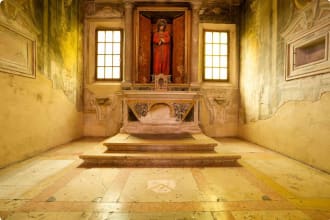
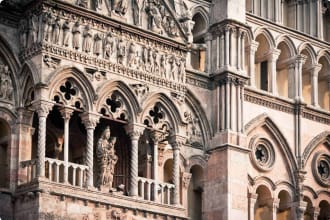
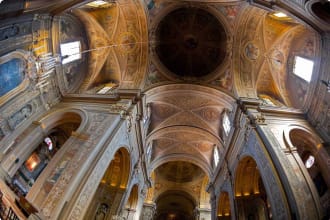
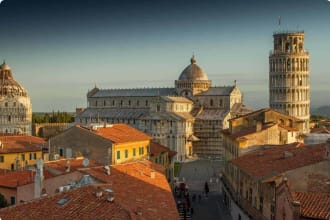
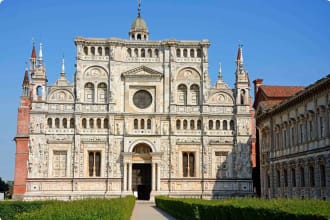
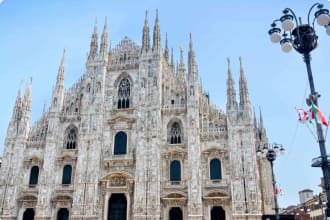
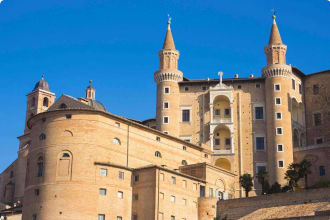
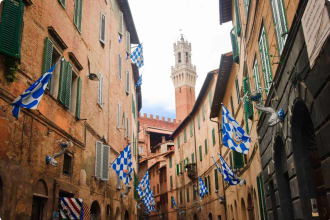
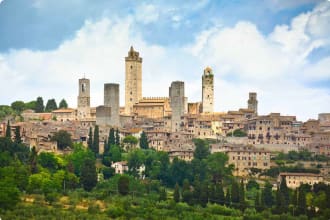
Itinerary
21 days
Day 1: Florence
Accommodation: Hotel Delle Nazioni or similar
In the afternoon meet your program leader in your Florence hotel for an introductory meeting and a welcome dinner.
Day 2: Florence
Accommodation: Hotel Delle Nazioni or similar.
This morning’s tour of Florence begins with a visit to Medici-Riccardi palace to view the famous frescoes showing the Medici family in the entourage of the Magi. From here we will visit the Convent of San Marco, The Academia, the Duomo.
Day 3: Florence
Accommodation: Hotel Delle Nazioni or similar.
Coach tour to the cities of San Gimignano, with its splendid towers, and Siena.
In Siena, a rival to Florence until it was absorbed into the larger state, we will spend time in the magnificent cathedral as well as in the Palazzo Publica with its frescoes of good and bad government.
Lunch is included today.
Day 4: Florence
Accommodation: Hotel Delle Nazioni or similar.
Early morning (8.30 am) visit to the Uffizi Gallery.
The rest of the day spent visiting San Lorenzo (for the Medici tombs), the Bargello, the Palazzo Vecchio, and finally, in the afternoon, the Pitti Palace.
Day 5: Florence
Accommodation: Hotel Delle Nazioni or similar.
We start with a morning visit to Santa Maria Novella in the morning.
We then visit to the city of Lucca with a brief stop in Pisa on the way home.
Group lunch today.
Day 6: Urbino
Accommodation: Albergo Italia or similar
Travel to Urbino with a stop in the city of Arezzo to visit the church of San Francisco de Arezzo to view the restored frescoes of Piero della Francesca.
Afternoon arrival in Urbino with time for a city walking tour. This tour includes Oratory of St Joseph as well as the National Gallery of Le Marche. In the national gallery this groups focus is on the painting of the ideal city. This piece served as the visual model for many renaissance towns.
Group dinner this evening
Day 7: Urbino
Accommodation: Albergo Italia or similar
Morning visit to the nearby city of Gubbio which was also ruled for a significant period by the Montefeltro family. Visit to the Palazzo Ducale which was rebuilt by Frederico.
Afternoon return to Urbino for some free time to explore this city.
Day 8: Urbino
Accommodation: Albergo Italia or similar
We have a full day of sightseeing in Urbino including the Palazzo Ducale with its important art collection, the Duomo which was rebuilt in 1801 but still contains important renaissance paintings, the house of Raphael and his father Geovanni Santi, the Oratory of St Joseph and the John the Baptist Oratory.
Day 9: Ferrara
Accommodation: Hotel Orologio or similar
Travel to Ferrara via San Marino, Rimini and Ravenna. There will be stops in Rimini to admire the Tempio Malatestiano built for the notorious Sigismondo Malatesta, Duke of Rimini and in Ravenna to visit one of the famous churches with their Byzantine mosaics.
Afternoon arrival in Ferrara.
Group dinner.
Day 10: Ferrara
Accommodation: Hotel Orologio or similar
Day of sightseeing in Ferrara including the Castello Estense, the Cathedral San Giorgio and the Palazzo dei Diamanti.
Optional dinner. Hosted in the oldest wine bar in Italy, Al Brindisi dating from 1435…
Day 11: Ferrara
Accommodation: Hotel Orologio or similar
Day tour to Padua to visit the Scrovegni Chapel with its wonderful frescoes by Giotto. This will be followed by a walking tour of Padua including a visit to the Palazzo della Ragioni.
Day 12: Ferrara
Accommodation: Hotel Orologio or similar.
This will be a second day of sightseeing in Ferrara including Palazzo Schifanoia, the Casa Romei, the convent of San Antonoi Polesina and the Corpus Domini Monastery.
Day 13: Mantua
Accommodation: Hotel dei Gonzanga or similar
Travel to Mantua.
Afternoon city tour with visits to the Ducal Palace, the house of Mantegna and the Basilica Sant‘Andrea.
Group dinner
Day 14: Mantua
Accommodation: Hotel dei Gonzaga or similar
Morning tour to Vespasiano’s planned town of Sabbioneta with its grid layout, Palazzo Ducal and Palazzo Giardino. We will also visit the Teatro all’antica, one of only three Renaissance theatres in existence.
Afternoon back in Mantua with a drive past the Casa Del Mercata, merchants house. The Casa is not open to the public.
Day 15: Mantua
Accommodation: Hotel dei Gonzaga or similar
Continued tour of Mantua with a visit to the luxurious Palazzo Te as well as the Palazzo Ragione and the Palazzo dei Podesta. Palazzo dei Podesta interior is closed for renovation currently.
Afternoon at leisure in Mantua.
Day 16: Milan
Accommodation: Eurohotel or similar
Travel to Milan
A city tour will include visits to Castello Sforzesco and the Pinacoteca dei Castello Sforzesco.
Group dinner.
Day 17: Milan
Accommodation: Eurohotel or similar
Visit to the city of Pavia, an important rival to Milan during the Renaissance period. This will include a visit to the Certosa di Pavia some 8 kilometres north of the city. We will also visit the Cathedral in Pavia, the Visconti Castle and the church of San Teodoro.
Day 18: Milan
Accommodation: Eurohotel or similar
Milan city sites tour will include the Cathedral and the Convent of Santa Maria delle Grazie with its famous “Last Supper” by Leonardo da Vinci.
Day 19: Milan
Accommodation: Eurohotel or similar
Visit to the city of Bergamo with its Academia Carrara, Palazzo dei Podesta. Palazzo della Ragione and Basilica di Santa Maria Maggiore.
Day 20: Milan
Accommodation: Eurohotel or similar
Morning visit to the Pinacoteca di Breria.
The rest of the day at leisure to explore and enjoy this bustling modern city with its rich history.
Farewell group dinner.
Day 21: Milan
Tour concludes after breakfast
Includes / Excludes
What’s included in our Tour
- 20 nights hotel accommodation including breakfast.
- Meals as indicated.
- Applicable entry fees and services of local guides.
- Transport, field trips and excursions as indicated.
- Touring by comfortable and modern coach as well as public transport.
- Gratuities and necessary tips.
- Services of an Odyssey program leader.
- Detailed Tour Information Booklet.
What’s not included in our Tour
- International airfares and departure taxes.
- Comprehensive travel insurance.
- Items of a personal nature, such as telephone calls and laundry.
- Meals not specified in the itinerary.
Participants must be able to carry their own luggage, climb and descend stairs, be in good health, mobile and able to participate in 3-5 hours of physical activity per day, the equivalent of walking / hiking up to 8 kilometers per day on uneven ground.
Book now
Make it a private tour
Easing your journey
Crossing international borders with restrictions
The list of requirements to travel internationally has changed and will continue to change for several years. Odyssey is here to assist you in managing your way through these requirements:
For more information see our Crossing international borders with restrictions page.
Book With Confidence
If less than 30 days before your tour starts you are unable to travel as a result of Government travel restrictions, Odyssey Traveller will assist you with a date change, provide you with a credit or process a refund for your booking less any non-recoverable costs.
See Terms and conditions for details.
Peace of Mind Travel
The safety of our travellers, tour leader, local guide and support staff has always been our top priority and with the new guidelines for public health and safety for keeping safe for destinations around the world, we’ve developed our plan to give you peace of mind when travelling with us.
See Peace of Mind Travel for details.
Reading List Download PDF
The Pursuit of Italy: A History of a Land, its Regions and their Peoples
David Gilmour
Visiting a villa built by Lorenzo de Medici outside Pisa, David Gilmour fell into conversation about the unification of Italy with a distinguished former minister: '"You know, Davide," he said in a low conspiratorial voice, as if uttering a heresy, "Garibaldi did Italy a great disservice. If he had not invaded Sicily and Naples, we in the north would have the richest and most civilized state in Europe." After looking cautiously round the room he added in an even lower voice, "Of course to the south we would have a neighbour like Egypt."'
Was the elderly Italian right? Was the unification of Italy a mistake? The Pursuit of Italy traces the whole history of the Italian peninsula in a wonderfully readable style, full of well-chosen stories and observations from personal experience, and peopled by many of the great figures of the Italian past, from Cicero and Virgil to Dante and the Medici, from Cavour and Verdi to the controversial political figures of the twentieth century. The book gives a clear-eyed view of the Risorgimento, the pivotal event in modern Italian history, debunking the influential myths which have grown up around it.
Gilmour shows that the glory of Italy has always lain in its regions, with their distinctive art, civic cultures, identities and cuisine. The regions produced the medieval communes and the Renaissance, the Venetian Republic and the Grand Duchy of Tuscany, two of the most civilized states of European history. Their inhabitants identified themselves not as Italians, but as Tuscans and Venetians, Sicilians and Lombards, Neapolitans and Genoese. This is where the strength and culture of Italy still comes from, rather than from misconceived and mishandled concepts of nationalism and unity.
This wise and enormously engaging book explains the course of Italian history in a manner and with a coherence which no one with an interest in the country could fail to enjoy.
Florence: The Biography of a City
Christopher Hibbert
This book is as captivating as the city itself. Hibbert's gift is weaving political, social and art history into an elegantly readable and marvellously lively whole. The author's book on Florence will also be at once a history and a guide book and will be enhanced by splendid photographs and illustrations and line drawings which will describe all teh buildings and treasures of the city.
Rome: The Biography of a City
Christopher Hibbert
This beautifully written, informative study is a portrait, a history and a superb guide book, capturing fully the seductive beauty and the many layered past of the Eternal City. It covers 3,000 years of history from the city's quasi-mythical origins, through the Etruscan kings, the opulent glory of classical Rome, the decadence and decay of the Middle Ages and the beauty and corruption of the Renaissance, to its time at the heart of Mussolini's fascist Italy. Exploring the city's streets and buildings, peopled with popes, gladiators, emperors, noblemen and peasants, this volume details the turbulent and dramatic history of Rome in all its depravity and grandeur.
The Popes: A History
John Julius Norwich
John Julius Norwich examines the oldest continuing institution in the world, tracing the papal line down the centuries from St Peter (traditionally - but by no means historically - the first Pope) to the present. Of the 280-odd holders of the supreme office, some have unquestionably been saints; others have wallowed in unspeakable iniquity.
One was said to have been a woman, her sex being revealed only when she improvidently gave birth to a baby during a papal procession. Almost as shocking was Formosus whose murdered corpse was exhumed, clothed in pontifical vestments, propped up on a throne and subjected to trial.
From the glories of Byzantium to the decay of Rome, from the Albigensian Heresy to controversy within the Church today, The Popes is superbly written, witty and revealing.
The Borgias
Christopher Hibbert
The name Borgia is synonymous with the corruption, nepotism, and greed that were rife in Renaissance Italy.
The powerful, voracious Rodrigo Borgia, better known to history as Pope Alexander VI, was the central figure of the dynasty. Two of his seven papal offspring also rose to power and fame - Lucrezia Borgia, his daughter, whose husband was famously murdered by her brother, and that brother, Cesare, who served as the model for Niccolo Machiavelli's The Prince. Notorious for seizing power, wealth, land, and titles through bribery, marriage, and murder, the dynasty's dramatic rise from its Spanish roots to its occupation of the highest position in Renaissance society forms a gripping tale.
Erudite, witty, and always insightful, Hibbert removes the layers of myth around the Borgia family and creates a portrait alive with his superb sense of character and place.
The Rise and Fall of the House of Medici
Christopher Hibbert
At its height Renaissance Florence was a centre of enormous wealth, power and influence. A republican city-state funded by trade and banking, its often bloody political scene was dominated by rich mercantile families, the most famous of which were the Medici. This enthralling book charts the family’s huge influence on the political, economic and cultural history of Florence. Beginning in the early 1430s with the rise of the dynasty under the near-legendary Cosimo de Medici, it moves through their golden era as patrons of some of the most remarkable artists and architects of the Renaissance, to the era of the Medici Popes and Grand Dukes, Florence’s slide into decay and bankruptcy, and the end, in 1737, of the Medici line.
The Black Prince of Florence: The Spectacular Life and Treacherous World of Alessandro de' Medici
Catherine Fletcher
'Nothing in sixteenth-century history is more astonishing than the career of Alessandro de' Medici' Hilary Mantel
In The Black Prince of Florence, a dramatic tale of assassination, spies and betrayal, the first retelling of Alessandro's life in two-hundred years opens a window onto the opulent, cut-throat world of Renaissance Italy.
‘Astonishing … gripping and original … a compelling portrait’ Financial Times
‘Packed with intrigue … Fletcher describes with cool menace the plotting and politicking that dominated Alessandro’s rule … brought splendidly to life in this excellent book’ Sunday Times
‘Engrossing … bursts with stabbings, poisonings, duels, eye-gougings, arquebus shootouts and people being run through with swords. Fletcher’s approach is scholarly yet dramatic, immersed in Renaissance glamour … a tremendous step forward in our knowledge of this intriguing man’ Spectator
‘Scintillating. This is everything a historical biography should be’ Ian Mortimer, author of The Time Traveller's Guide to Medieval England
The year is 1531. After years of brutal war and political intrigue, the bastard son of a Medici Duke and a ‘half-negro’ maidservant rides into Florence. Within a year, he rules the city as its Prince. Backed by the Pope and his future father-in-law the Holy Roman Emperor, the nineteen-year-old Alessandro faces down bloody family rivalry and the scheming hostility of Italy’s oligarchs to reassert the Medicis’ faltering grip on the turbulent city-state. Six years later, as he awaits an adulterous liaison, he will be murdered by his cousin in another man’s bed.
From dazzling palaces and Tuscan villas to the treacherous backstreets of Florence and the corridors of papal power, the story of Alessandro’s spectacular rise, magnificent reign and violent demise takes us deep beneath the surface of power in Renaissance Italy – a glamorous but deadly realm of spies, betrayal and vendetta, illicit sex and fabulous displays of wealth, where the colour of one’s skin meant little but the strength of one’s allegiances meant everything.
‘Bold, breathless and full of suspense’ The Times
‘Original, revelatory and gripping’ Jessie Childs, author of God's Traitors
‘Gripping … Fletcher describes in detail without losing momentum’ Economist
‘Fascinating and profound’ Paul Strathern, author of The Medici
‘Accomplished and original. A newly sympathetic portrait of a monarch whose rule in Florence was even more unlikely than Henry VII’s presence on the English throne’ Diarmaid MacCulloch, author of A History of Christianity
‘Brilliantly written and impeccably researched. A stunning book’ Tracy Borman, author of Thomas Cromwell
Art of the Italian Renaissance Courts
Alison Cole
This fascinating study of Renaissance courtly art and culture in fifteenth and early sixteenth-century Italy encompasses the most recent scholarship on the courts, court art and noble values. Alison Cole not only considers the role of artists, but explores the distinctive uses to which art was put at the courts, from the smaller duchies and princely courts of Ferrara, Mantua and Urbino to the larger courts of Naples and Milan. The social, intellectual and artistic milieu of each court is brought vividly to life, along with the complex personalities of the rulers, their relationships with the civic and ecclesiastical authorities, and the role of court women as patrons of the arts. Drawing on a wide range of contemporary texts and visual material, Cole paints a rich picture of the these extraordinary courts in the moment of their greatest brilliance.
A Short History of the Italian Renaissance
Virginia Cox
The extraordinary creative energy of Renaissance Italy lies at the root of modern Western culture. In her elegant new introduction, Virginia Cox offers a fresh vision of this iconic moment in European cultural history, when - between the fourteenth and sixteenth centuries - Italy led the world in painting, building, science and literature. Her book explores key artistic, literary and intellectual developments, but also histories of food and fashion, map-making, exploration and anatomy. Alongside towering figures such as Leonardo da Vinci, Michelangelo, Raphael, Petrarch, Machiavelli and Isabella d'Este, Cox reveals a cast of lesser-known protagonists including printers, travel writers, actresses, courtesans, explorers, inventors and even celebrity chefs. At the same time, Italy's rich regional diversity is emphasised; in addition to the great artistic capitals of Florence, Rome and Venice, smaller but cutting-edge centres such as Ferrara, Mantua, Bologna, Urbino and Siena are given their due. As the author demonstrates, women played a far more prominent role in this exhilarating resurgence than was recognized until very recently - both as patrons of art and literature and as creative artists themselves. 'Renaissance woman', she boldly argues, is as important a legacy as 'Renaissance man'.
The Cardinal’s Hat
Professor Mary Hollingsworth
Working with Ippolito's letters and ledgers, recently uncovered in an archive in Modena, Italy, Mary Hollingsworth has pieced together a fascinating and undeniably titillating tale of this Renaissance cardinal and his road to power and wealth in sixteenth century Europe. The ledgers document every aspect of Ippolito's comings and goings, and he comes to life out of the minutiae, as do the lives of his staff.
The Ugly Renaissance
Alexander Lee
Featuring the beauties of Michelangelo and Leonardo da Vinci, combined with the dark and hidden side of the Renaissance, by an acclaimed historian and expert in the period. Renowned as an age of artistic rebirth, the Renaissance is cloaked with an aura of beauty and brilliance. But behind the Mona Lisa's smile lurked a seamy, vicious world of power politics, perversity and corruption that has more in common with the present day than anyone dares to admit. Enter a world of corrupt bankers, greedy politicians, sex-crazed priests, rampant disease, and lives of extravagance and excess. Enter the world of the ugly Renaissance. Uncovering the hidden realities beneath the surface of the period's best-known artworks, historian Alexander Lee takes the reader on a breathtaking and unexpected journey through the Italian past and shows that, far from being the product of high-minded ideals, the sublime monuments of the Renaissance were created by flawed and tormented artists who lived in an ever-expanding world of bigotry and hatred. The only question is: will you ever see the Renaissance in quite the same way again?
The Tigress of Forli
Elizabeth Lev
A strategist to match Machiavelli; a warrior who stood toe to toe with the Borgias; a wife whose three marriages would end in bloodshed and heartbreak; and a mother determined to maintain her family s honor, Caterina Riario Sforza de Medici was a true Renaissance celebrity, beloved and vilified in equal measure. In this dazzling biography, Elizabeth Lev illuminates her extraordinary life and accomplishments. Raised in the court of Milan and wed at age ten to the pope s corrupt nephew, Caterina was ensnared in Italy s political intrigues early in life. After turbulent years in Rome s papal court, she moved to the Romagnol province of Forli. Following her husband s assassination, she ruled Italy s crossroads with iron will, martial strength, political savvy, and an icon s fashion sense. In finally losing her lands to the Borgia family, she put up a resistance that inspired all of Europe and set the stage for her progeny including Cosimo de Medici to follow her example to greatness.
Power and Imagination: City-States in Renaissance Italy
Lauro Martines
This work contends that the Italian Renaissance ought to be considered in two stages: one, the eleventh century to 1300 when the urban political groundwork is laid; and two, 1300 to 1600 when the resulting cultural explosion occurs.
The Pope's Daughter
Caroline P. Murphy
The untold story of how Felice della Rovere, the illegitimate daughter of Pope Julius II, became the most powerful woman in Rome. Caroline P. Murphy evokes not only the great turbulence and creativity of Renaissance Italy, but also Felice's daily life, from dealing with squabbles among servants to her advice on the best way to bribe a Pope.
The Medici : Godfathers of the Renaissance
Paul Strathern
A dazzling history of the modest family which rose to become one of the most powerful in Europe, The Medici is a remarkably modern story of power, money and ambition. Against the background of an age which saw the rebirth of ancient and classical learning Paul Strathern explores the intensely dramatic rise and fall of the Medici family in Florence, as well as the Italian Renaissance which they did so much to sponsor and encourage. Strathern also follows the lives of many of the great Renaissance artists with whom the Medici had dealings, including Leonardo, Michelangelo and Donatello; as well as scientists like Galileo and Pico della Mirandola; and the fortunes of those members of the Medici family who achieved success away from Florence, including the two Medici popes and Catherine de' Medicis, who became Queen of France and played a major role in that country through three turbulent reigns.
Lucrezia Borgia: Life, Love, and Death in Renaissance Italy
Sarah Bradford
The very name Lucrezia Borgia conjures up everything that was sinister and corrupt about the Renaissance—incest, political assassination, papal sexual abuse, poisonous intrigue, unscrupulous power grabs. Yet, as bestselling biographer Sarah Bradford reveals in this breathtaking new portrait, the truth is far more fascinating than the myth. Neither a vicious monster nor a seductive pawn, Lucrezia Borgia was a shrewd, determined woman who used her beauty and intelligence to secure a key role in the political struggles of her day. Drawing from a trove of contemporary documents and fascinating firsthand accounts, Bradford brings to life the art, the pageantry, and the dangerous politics of the Renaissance world Lucrezia Borgia helped to create.


